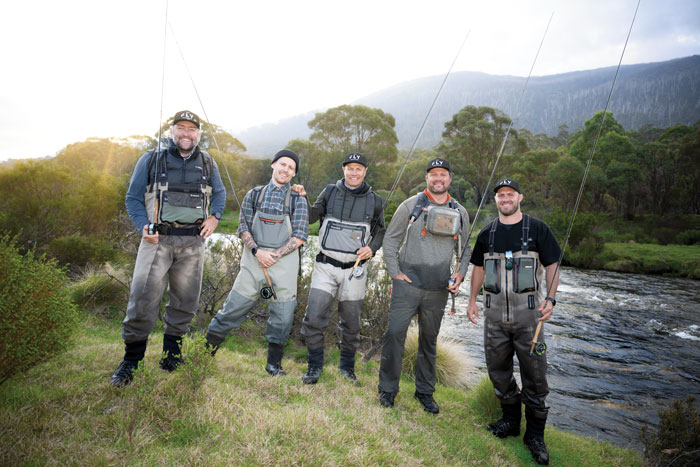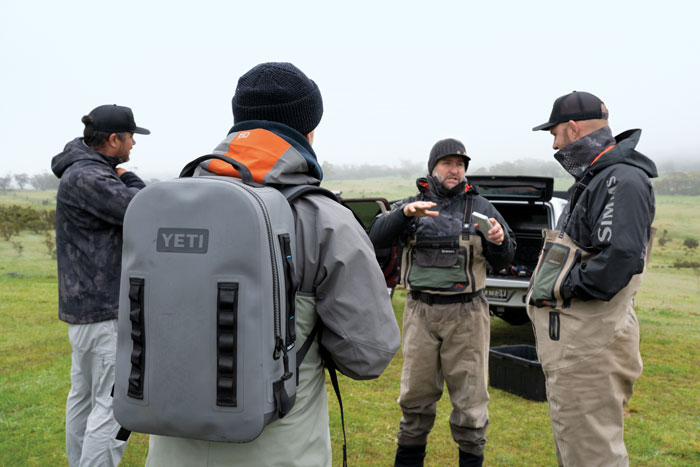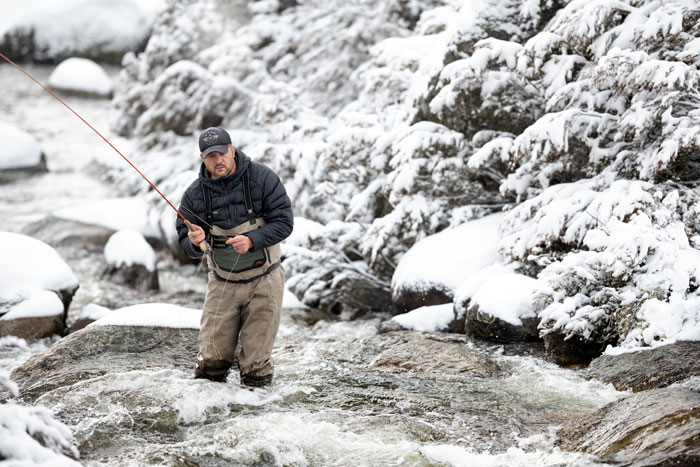Driven to address high male suicide rates, Matt Tripet brings together fly-fishing, time in nature and supportive conversations to help men improve their mental health
By Anne Crawford, Photos Shottobits
High in the upper reaches of the Thredbo River, New South Wales, lifelong fisher Matt Tripet is teaching a group of men “stream craft”; everything from how to analyse a river system to catching and releasing a trout, which insects they eat, safe-handling practices and how to protect the trout from damage.
As he does, he is also guiding the men towards improving their mental wellbeing.
Tripet is the CEO and founder of the Fly Program, a scheme that takes groups of 10 men on a four-day fly-fishing retreat where they are helped with any mental health challenges. Participants include army personnel who saw combat in Afghanistan or Iraq, paramedics, police or firefighters with post-traumatic stress disorder, through to first-time fathers struggling to keep their job.
Not all have experienced trauma or mental health issues; some men just want to take time out to improve their state of mind. The program, with participants aged 18 to 78 years, is pitched at early intervention and prevention.

Engaging in nature
“It’s all about using the power of the outdoors and of fishing to get people engaged with the environment and conversations,” Tripet says. “The program creates an incredible support around people and really does characterise taking action on mental wellbeing rather than depressing problems with booze or just ignoring them, as so many guys do. It’s about being aware of issues in our lives and being committed to taking action on those issues,” he says.
“Fly-fishing gets us out there, puts the water around our legs and gets us into nature,” Tripet says. “It gets us engaged with things that are really important, that we don’t engage with very often anymore. That’s probably one of the biggest reasons why I have this thing for being on water, for fishing up in the mountains.”
Tripet has gone fly-fishing since he was a 10-year-old boy growing up in Tamworth, NSW. Every weekend he, his three brothers and his father would take their fly rods and head to the tablelands in north-east NSW around the small town of Walcha. Fly-fishing has been a strong part of his life ever since. He found the activity centred him, and helped to build positive relationships, including those with his family and other fly-fishers, who came to be a kind of extended family for him.
Tripet became a physical education teacher and worked jobs in education connected to the fly-fishing industry, including as a fly casting instructor. In 2010, he took on a management role at Lake Crackenback Resort on the banks of the Thredbo River, and had fly-fishing instruction among his duties.
“I saw the wonderful benefits of bringing people into the outdoors and, particularly, of putting a rod in their hand. I was always amazed at the calibre of conversation you’d have with a participant, who was essentially a stranger, when you’re in the water and have the opportunity to talk and be ourselves.”

Purpose in action
In 2013, Tripet received the shattering news that his brother-in-law Justin had taken his own life. “I suppose that after the rawness of those first six months or so I just felt a great sense of purpose.”
That sense of purpose led to a boardroom table in Canberra, where Tripet urged four others to put their skills to use on one of the biggest issues in Australian society: male suicide. Six Australian men take their lives every day, and help-seeking behaviour in adult males is “horrifically low”.
Fishing seemed the perfect antidote. It is a popular pastime that attracts five million Australians a year. Most (70 per cent) of those who come to the Fly Program are already recreational anglers, and 20 per cent of those are trout anglers who may fly-fish, Tripet says.
A quarter of those who come may have fished as a child but do not get a chance to fish now and are keen to learn again and enjoy the health benefits of the program, he says. Of the new recreational anglers, 100 per cent have become converts who go home and fish in their local waterways on a regular basis, largely using the fly-fishing method.
Feedback from the men and independent research from the University of Canberra suggest the program has been highly successful.
Hundreds of men across every state and territory (and one from overseas) have participated in the program since it started five years ago, going to retreats mainly in NSW’s Snowy Mountains but also in Victoria and Tasmania.
“There’s been an extraordinary amount of support to see this happen,” says Tripet.
From starting with no money in 2016, more than $500,000 has been invested in the program. This includes $100,000 from the NSW Department of Primary Industries Recreational Fishing Trust, which reinvests funds gained through fishing licences into recreational fishing projects.
The wellbeing program, dubbed The Manifesto and developed by clinical psychologists, continues for seven weeks after the men return home, offering weekly activities such as mindfulness, exercise and nutrition, with the men supported by each other in a private forum. “If someone is having a bad day, someone else in the group or several people will give them a call.”

Changing environment
Tripet, now aged 40, says recreational trout fishing has changed significantly over the years. “In the days pre-Rex Hunt, everyone caught and ate everything. After that Rex Hunt era, catch and release came into fruition – that was a major change.
“There’s a lot of focus now around sustainability, and a lot more education around sustainable fishing practices. That’s the major change since 25 or 30 years ago.”
The Fly Program uses and teaches participants these practices, he says.
Another major change has been in social connectedness. “It’s very easy to get info now about recreational fishing through social media – we can understand where the fish are biting and be reactive to that.”
The rivers and streams of NSW’s Snowy Mountains, recognised as a world-class trout fishery, are full of trout. Brown Trout (Salmo trutta) and Rainbow Trout (Oncorhynchus mykiss) are Tripet’s target species. But he says the waterways he fished as a child no longer support trout as they once did.
Environmental impacts such as drought and warmer water have had a significant impact on marginal streams in this and other areas. “Trout can’t live in water that’s about 23 to 24 degrees in the middle of summer for any period of time – it would kill them. Those streams are getting well over those temperatures.”
Tripet sits on the Recreational Fishing NSW Advisory Council, which is conducting a review of trout strategy in Australia and NSW. Tripet expects the review will lead to a re-evaluation of governance and management of the species in Australian waterways.
More information
If you know anyone in your community who could benefit from this program, please email info@fly.program.org.au or go to The Fly Program.





